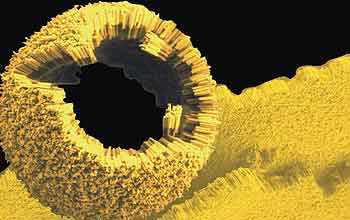|

Press Release 04-007
Nanoscale Building Blocks Form Spheres, Tubes and Curves

Self-assembling structures could find wide use in nanoelectronics and drug delivery
January 16, 2004
Inspired by the molecular assembly techniques used in living cells, chemist Chad Mirkin and his colleagues at Northwestern University have created a new class of nanometer-scale building blocks that can spontaneously assemble themselves into ultra-tiny spheres, tubes and curved sheets.
This is the first time that scientists have been able to make structures on this scale that curve in any fashion, as opposed to being straight or flat. Since the Mirkin group can also control the size and curvature of their structures very accurately, the technology could eventually lead to important applications in nanoscale electronics and drug-delivery systems.
Mirkin and his colleagues were supported in part by the National Science Foundation (NSF), and are publishing their discovery in the 16 January 2004 issue of the journal Science. A press release detailing their work is available from Northwestern.
-NSF-

Media Contacts
M. Mitchell Waldrop, NSF (703) 292-7752 mwaldrop@nsf.gov
Principal Investigators
Chad Mirkin, Northwestern University (847) 722-0634 camirkin@chem.northwestern.edu

The National Science Foundation (NSF) is an independent federal agency that supports fundamental research and education across all fields of science and engineering. In fiscal year (FY) 2009, its budget is $9.5 billion, which includes $3.0 billion provided through the American Recovery and Reinvestment Act. NSF funds reach all 50 states through grants to over 1,900 universities and institutions. Each year, NSF receives about 44,400 competitive requests for funding, and makes over 11,500 new funding awards. NSF also awards over $400 million in professional and service contracts yearly.
 Get News Updates by Email Get News Updates by Email
Useful NSF Web Sites:
NSF Home Page: http://www.nsf.gov
NSF News: http://www.nsf.gov/news/
For the News Media: http://www.nsf.gov/news/newsroom.jsp
Science and Engineering Statistics: http://www.nsf.gov/statistics/
Awards Searches: http://www.nsf.gov/awardsearch/
| 

